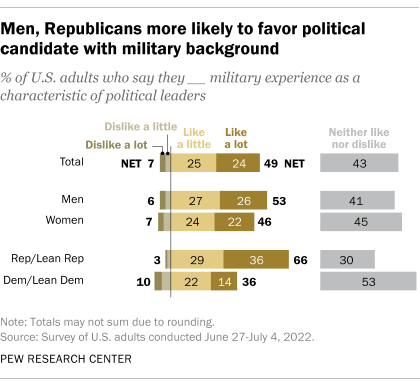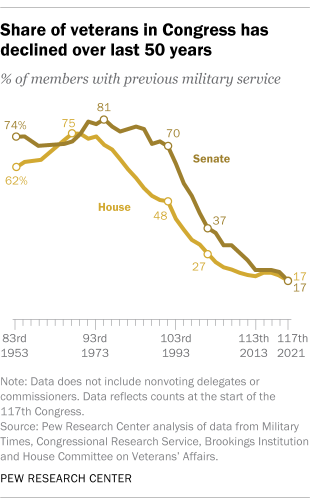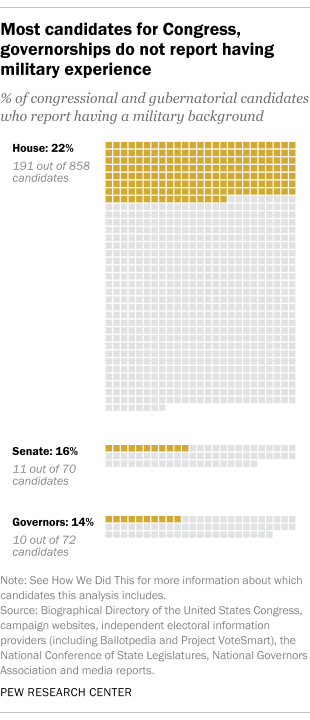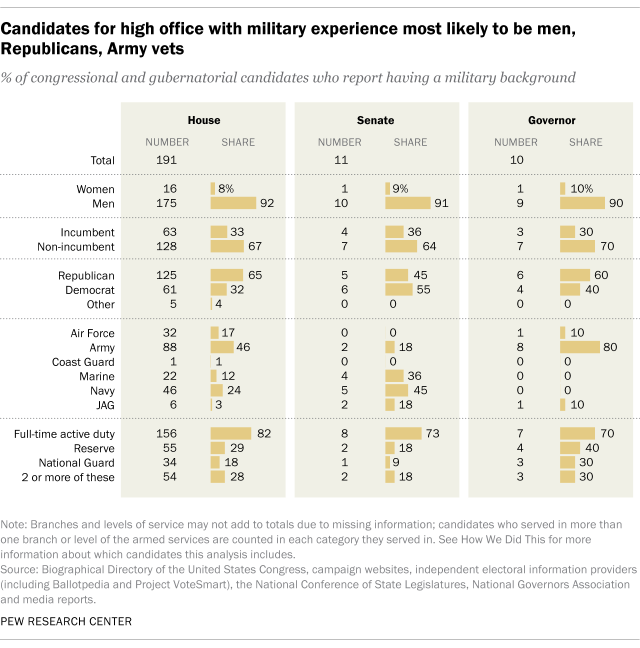Note: For the latest data on veterans in the 118th Congress, read our December 2022 post.
Military experience is often a positive, and seldom a negative, when Americans evaluate their political leaders – a fact that could work in favor of the more than 200 veterans running for high office in November’s elections.
Around a fifth (21%) of the roughly 1,000 candidates for U.S. Senate, U.S. House or state governor on the fall ballot – 212 in all – claim some degree of military experience, according to a Pew Research Center examination of their campaign websites, official biographies, public statements and media reports. About nine-in-ten of those veteran-candidates are men, and nearly two-thirds are Republican.

In a survey conducted by the Center this summer, 49% of Americans – and 53% of registered voters – say they like political leaders who have served in the military, including about a quarter in both groups who say they like it a lot. Military service is a non-factor for sizable shares: 43% of all respondents and 41% of registered voters say they neither like nor dislike it when political leaders have served in the armed forces. Just 7% of U.S. adults and 5% of registered voters say they dislike leaders with military experience.
The military service of at least one congressional candidate has been in the news this election cycle. In September, The Associated Press reported that J.R. Majewski, the Republican nominee in Ohio’s 9th District, had misrepresented his military service. Majewski, who served in the Air Force from 1999 to 2003, had claimed to be a combat veteran who deployed to Afghanistan, though he actually spent most of his military career at Kadena Air Base in Japan and later helped load planes at an air base in Qatar for six months, according to the AP. Subsequent reporting has cast doubt on other claims Majewski has made about his Air Force service.
With Election Day approaching, here’s a closer look at the veterans who are running for Congress or a governorship this fall. (In reading this analysis, keep in mind that all the information about candidates’ military service is, directly or indirectly, self-reported. For more information, read How We Did This.)
As this year’s midterm elections approach, Pew Research Center conducted this analysis to find out how many of this year’s candidates are military veterans, especially given a recent Center poll that indicated roughly half of Americans look favorably on military service by political leaders.
This analysis focuses on candidates for the entire U.S. House of Representatives and 35 U.S. Senate seats, as well as the 36 governorships being decided this year. For each office, we identified the two leading candidates – in the vast majority of cases, the Republican and Democratic nominees. When a major-party nominee’s only opponent was an independent or third-party candidate, we included that person in our analysis; otherwise, we excluded them, along with all write-in candidates.
In six House races in California and one in Louisiana, the November election is between two candidates of the same party. In these races, both candidates are included in this analysis. In 16 House districts, 13 Republicans and three Democrats are running essentially unopposed. And in Alaska’s at-large district and one Louisiana district, this analysis includes four candidates due to quirks in those states’ election laws.
For current and former members of Congress, our main source for military service information was the Biographical Directory of the United States Congress. For current and former governors, it was the National Governors Association. For everyone else, we consulted a range of sources, including campaign websites, independent electoral information providers (including Ballotpedia and Project VoteSmart), the National Conference of State Legislatures and media reports.
We used biographical data from the sources above to determine each candidate’s gender and whether or not they identified as a veteran or claimed to have served in the military. For candidates who did claim veteran status, we noted which branch of the military they served in (Army, Navy, Air Force, Marine Corps, Coast Guard), which level or levels they served at (full-time active duty, reserve forces, National Guard), their years of service, their final rank, any specialty (such as JAG Corps, medical corps or Special Forces) and whether they had served overseas in an active combat role.
Much of this same information is available from the National Archives, the official repository for military personnel records. However, each candidate’s record would have had to have been requested separately, in writing. The Center opted against that approach due to the large number of candidates in our dataset and the short time period between the end of primary season and the November election.
This analysis also includes information from a recent Pew Research Center survey that asked Americans whether they like or dislike political leaders who have military experience. The survey was conducted among 6,174 U.S. adults between June 27 and July 4, 2022. Everyone who took part is a member of the Center’s American Trends Panel (ATP), an online survey panel that is recruited through national, random sampling of residential addresses. This way nearly all U.S. adults have a chance of selection. The survey is weighted to be representative of the U.S. adult population by gender, race, ethnicity, partisan affiliation, education and other categories. Read more about the ATP’s methodology.
Here is the question asked in the survey, along with responses, and its methodology.
Veterans on this fall’s congressional ballots
Out of 858 House candidates, 191 (or 22%) claimed some degree of military experience, from former generals who’d spent most of their adult lives in uniform to vets whose service lasted only a few years. In the Senate, 11 of the 70 candidates in this analysis, or 16%, say they have prior military experience. (Read How We Did This for more information about which candidates this analysis includes.)

These figures are roughly comparable to the findings of a separate Center analysis, published in the first months of the current Congress. That report found that 17% of the then-current membership of both the House and Senate were veterans, down from highs of 75% in the House in 1967 and 81% in the Senate in 1975.
This year, about three-in-ten Republican House candidates (125 out of 426, or 29%) say they are veterans, compared with 15% (61 out of 419) of Democratic House candidates. Looked at another way, roughly two-thirds of House candidates with military experience (65%) are Republicans, while 32% are Democrats. (In addition, three veteran candidates for the House are Libertarians, one is a member of the Green Party and one has no party affiliation.)

Among the 11 Senate candidates who have served in the military, five are Republicans and six are Democrats.
Among the general public, Republicans are more likely than Democrats to have a positive view of political leaders having military experience. In the Center’s recent survey, about two-thirds of Republicans and Republican leaners (66%) say they like political leaders who have military experience to some degree; the corresponding figure among Democrats and those who lean Democratic is 36% (around half of Democrats – 53% – say they neither like nor dislike candidates with military credentials).
Nearly all (185 of 202, or 92%) of the veteran-candidates for House and Senate are male, even though 28% of all congressional candidates who we studied were female. In the Center’s recent poll, women are slightly less likely to favor political leaders having military experience: 46% say they liked such experience, versus 53% of men.
In each chamber, women account for just under one-in-ten candidates with military experience: 16 of the 191 veteran-candidates running for the House this year are women, as is just one of the 11 military vets running for Senate: incumbent Senator Tammy Duckworth (D-Ill.), a combat veteran who served in both the Army Reserve and Illinois Army National Guard.
The 16 women veterans on the ballot for the House are evenly split between Democrats and Republicans. Just four are incumbents: Chrissy Houlahan (D-Pa.), Mikie Sherrill (D-N.J.), Elaine Luria (D-Va.) and Mariannette Miller-Meeks (R-Iowa).
Just under half of House and Senate candidates with military backgrounds (45%) say they have served in the Army, Army Reserves or Army National Guard – the largest share in any one branch. A quarter served in the Navy or Naval Reserve; 16% are veterans of the Air Force, Air Force Reserve or Air National Guard; and 13% were in the Marine Corps or Marine Corps Reserve. Eight candidates served as attorneys in the Judge Advocate General’s Corps, the military’s legal arm, and one served in the Coast Guard.
Looking at just the candidates running for the Senate, the largest numbers have served in the Navy (5) or the Marine Corps (4). Two have served in the Army and two have served as judge advocates – the term of art for military lawyers.
About eight-in-ten congressional candidates with military experience (81%) have served full time on active duty, another 28% have served in the reserves and 17% were in the National Guard. Just over a quarter (28%) served in at least two of these levels during the course of their military career.

Veterans seeking governorships
Ten of the 72 gubernatorial candidates vying for office this year say they have military experience. Six of the group are Republicans and four are Democrats. By comparison, among currently serving state governors, six of the 50, or 12%, are veterans: four Republicans and two Democrats.
Just one of this year’s veteran gubernatorial candidates is a woman – Democrat Theresa Livingston, who served in the Air Force for nine years and is running for governor of Wyoming. This compares with about a third of gubernatorial candidates overall who are women (35%).
Livingston is the sole Air Force veteran among this year’s gubernatorial candidates with military experience. Eight of the 10 have served in the Army and one, incumbent Gov. Ron DeSantis of Florida, was an attorney in the Navy’s JAG Corps.
Seven of the 10 veterans running for governorships this year are challenging incumbents, and in no state do both major-party candidates have military service backgrounds.




